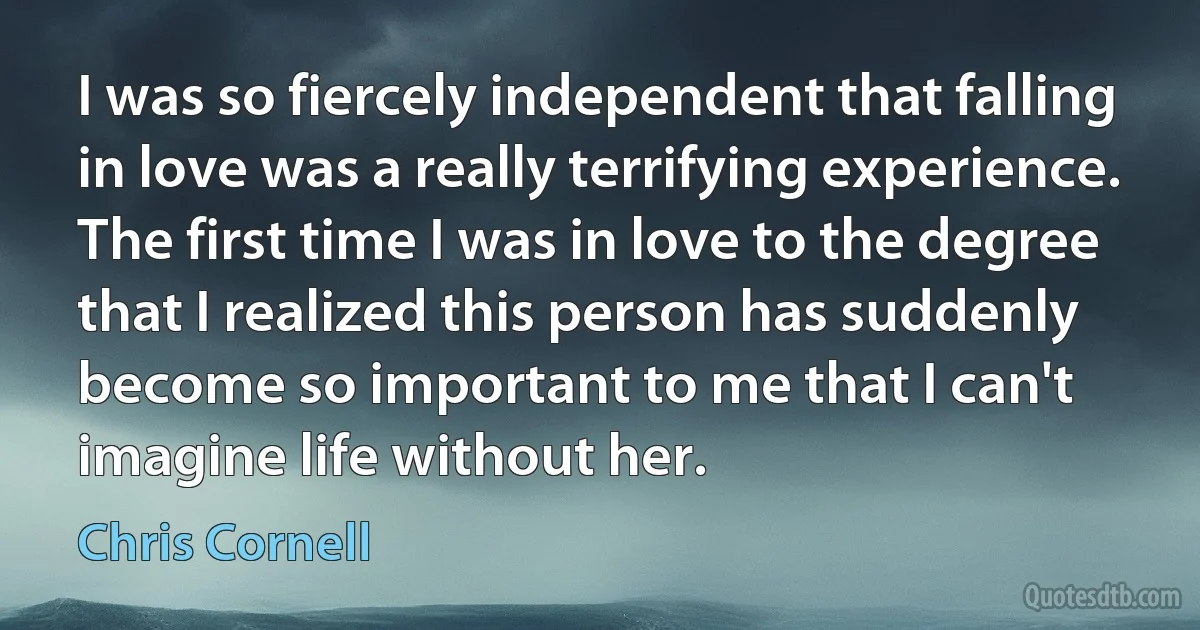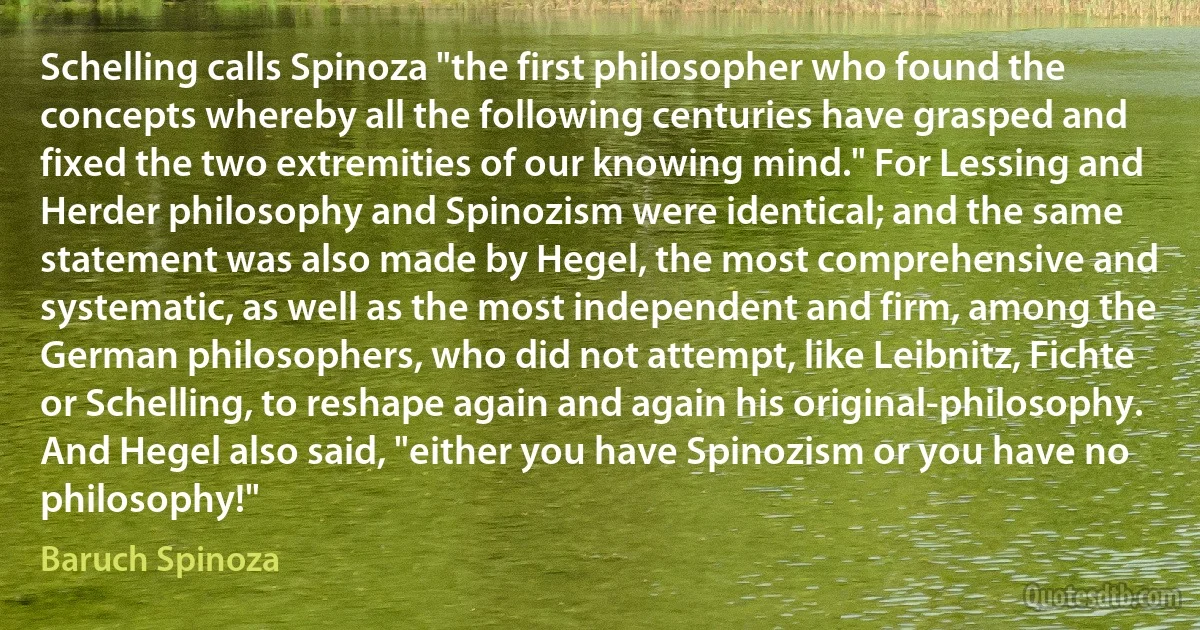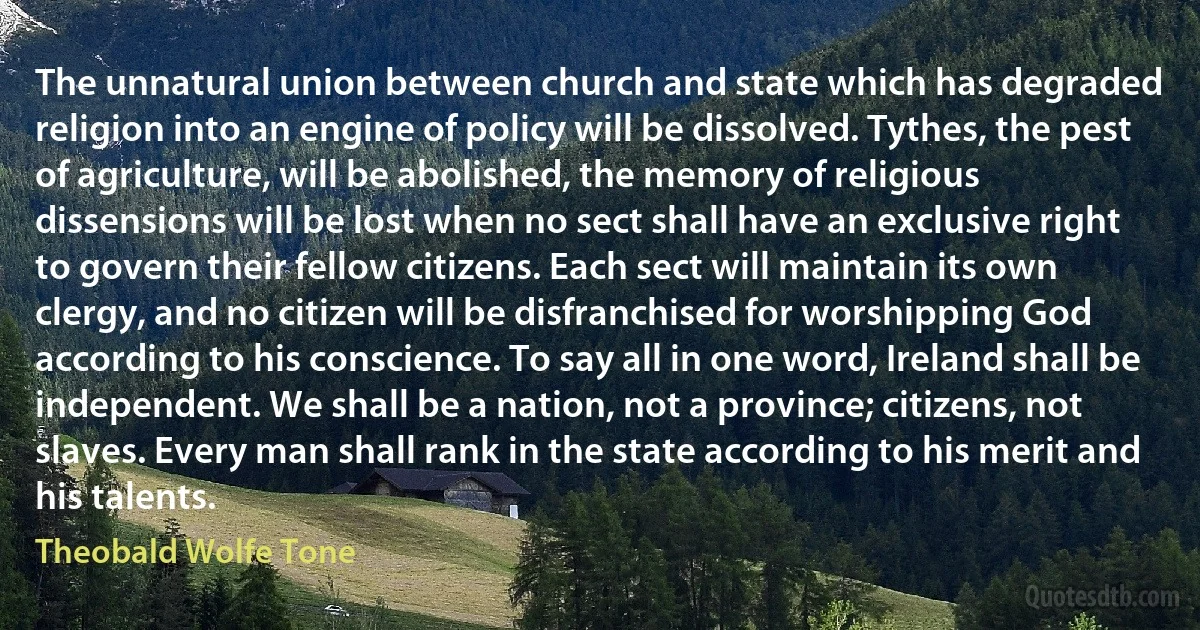Independent Quotes - page 63
Curzon told the Asiatic Society of Bengal: If there be any one who says to me that there is no duty devolving upon a Christian Government to preserve the monuments of a pagan art, or the sanctuaries of an alien faith, I cannot pause to argue with such a man. Art and beauty, and the reverence that is owing to all that has evoked human genius or has inspired human faith, are independent of creeds, and, in so far as they touch the sphere of religion, are embraced by the common religion of all mankind.... There is no principle of artistic discrimination between the mausoleum of the despot and the sepulchre of the saint. What is beautiful, what is historic, what tears the mask off the face of the past, and helps us to read its riddles, and to look it in the eyes-these, and not the dogmas of a combative theology, are the principle criteria to which we must look.52.

George Curzon, 1st Marquess Curzon of Kedleston
There are only two ways to conquer destiny or to be independent of it. One is to enquire whose this destiny is and discover that only the ego is bound by it and not the Self, and that the ego is non-existent. The other way is to kill the ego by completely surrendering to the Lord, realizing one's helplessness and saying all the time, 'Not I, but Thou, oh Lord', giving up all sense of 'I' and 'mine' and leaving it to the Lord to do what he likes with you.

Ramana Maharshi
The cultural competition of the early Cold War years was asymmetrical. Among European cultural elites there was still a widespread sentiment that they shared, across ideological divides and even bridging the Iron Curtain, a common culture to which America posed a threat. The French in particular took this line, echoing the early post-war efforts of their diplomats to trace an international policy independent of American control.

Tony Judt
A principal characteristic of technique ... is its refusal to tolerate moral judgments. It is absolutely independent of them and eliminates them from its domain. Technique never observes the distinction between moral and immoral use. It tends on the contrary, to create a completely independent technical morality.
Here, then, is one of the elements of weakness of this point of view. It does not perceive technique's rigorous autonomy with respect to morals; it does not see that the infusion of some more or less vague sentiment of human welfare cannot alter it. Not even the moral conversion of the technicians could make a difference. At best, they would cease to be good technicians. This attitude supposes further that technique evolves with some end in view, and that this end is human good. Technique is totally irrelevant to this notion and pursues no end, professed or unprofessed.

Jacques Ellul
In 1940 the voice which cried "Speak for England" came from a Tory bench. It comes from there no longer... The Conservative Party declared that the nation state as exemplified by an independent and self-governing United Kingdom was obsolete. Thereby for me the Conservative Party ceased to be the Conservative Party which I thought I knew.

Enoch Powell
It was not merely a question whether the Bourbon family, which had already given so many benefits to France, and among them, that best of all benefits, peace, should continue to reign in France, but whether tyranny and despotism should again reign over the independent nations of the continent? Whether as applied to this country, we should enjoy the happy state that we had bought with our blood after a long struggle, or whether we should once more revert to that artificial system which, during that struggle, we were compelled to maintain? Upon these points there could exist only one feeling, and his lordship trusted that Providence would ordain only one result.

Robert Stewart, Viscount Castlereagh
"We have sympathized with the misplaced obsessive emotionality you have thrown into your delusional activities.”
"What do you mean, ‘delusional'? I know what I'm doing!”
The priest shook his head gently. "Whatever you think is wrong. I suppose you feel that you live your own life and strive to achieve your goals?”
"Well, of course!”
"But that is not the case at all. Actually, you have no independent life of your own. You do not live, you are lived! You are a completely automatic mechanism with a built-in I-reflex. Your life has no meaning, since you are not even a person. You are nothing more than a short-lived, inconsistent, and accidental collection of tendencies. Your only possible relevance is as the unwitting vehicle for the purpose of bringing forth the Avatar.”.

Robert Sheckley
Don't you believe in flying saucers, they ask me? Don't you believe in telepathy? - in ancient astronauts? - in the Bermuda triangle? - in life after death?
No, I reply. No, no, no, no, and again no.
One person recently, goaded into desperation by the litany of unrelieved negation, burst out "Don't you believe in anything?"
"Yes", I said. "I believe in evidence. I believe in observation, measurement, and reasoning, confirmed by independent observers. I'll believe anything, no matter how wild and ridiculous, if there is evidence for it. The wilder and more ridiculous something is, however, the firmer and more solid the evidence will have to be."

Isaac Asimov
A people who have courageously opposed French domination for more than eighty years, a people who have fought side by side with the Allies against the Fascists during these last years, such a people must be free and independent.
For these reasons, we, members of the Provisional Government of the Democratic Republic of Vietnam, solemnly declare to the world that Vietnam has the right to be a free and independent country and in fact it already has been so. The entire Vietnamese people are determined to mobilize all their physical and mental strength, to sacrifice their lives and property in order to safeguard their independence and liberty.

Ho Chí Minh
Do not be mistaken about the word "Substance.” Spinoza took it in its purest meaning, and had to take it in that way if he wanted to proceed geometrically and set down a primitive notion as a basis. What is Substance but a thing which is self-dependent, which has the cause of its existence in itself? I wish that this pure meaning of the word could have been introduced into our philosophy. In the strictest sense, nothing in the world is a Substance, because everything depends on everything else, and finally on God, who therefore is the highest and only Substance. This geometrical conception could not have become generally adopted in a philosophy which must preserve its popular character, for we, in all our dependence yet consider ourselves independent, and in a certain sense, as we shall soon see, we may so consider ourselves.

Baruch Spinoza
Socrates is not just expounding noble ideas in a vacuum. He is in the middle of a war between those who think truth is absolute and those who think truth is relative. He is fighting that war with everything he has. The Sophists are the enemy.
Now Plato's hatred of the Sophists makes sense. He and Socrates are defending the Immortal Principle of the Cosmologists against what they consider to be the decadence of the Sophists. Truth. Knowledge. That which is independent of what anyone thinks about it. The ideal that Socrates died for. The ideal that Greece alone possesses for the first time in the history of the world. It is still a very fragile thing. It can disappear completely. Plato abhors and damns the Sophists without restraint, not because they are low and immoral people-there are obviously much lower and more immoral people in Greece he completely ignores. He damns them because they threaten mankind's first beginning grasp of the idea of truth. That's what it is all about.

Robert M. Pirsig
Let us begin by observing that the word "system" is almost never used by itself; it is generally accompanied by an adjective or other modifier: physical system; biological system; social system; economic system; axiom system; religious system; and even "general" system. This usage suggests that, when confronted by a system of any kind, certain of its properties are to be subsumed under the adjective, and other properties are subsumed under the "system," while still others may depend essentially on both. The adjective describes what is special or particular; i.e., it refers to the specific "thinghood" of the system; the "system" describes those properties which are independent of this specific "thinghood."

Robert Rosen
The search for subversives results in the intimidation of the independent, the original, the imaginative, and the experimental-minded... It discourages the discussion of controversial matters in the classroom, for such discussion may be reported, or misreported, and cause trouble.

Henry Steele Commager
There were no such thing as Palestinians. When was there an independent Palestinian people with a Palestinian state? It was either southern Syria before the First World War, and then it was a Palestine including Jordan. It was not as though there was a Palestinian people in Palestine considering itself as a Palestinian people and we came and threw them out and took their country away from them. They did not exist.

Golda Meir
Georgia is the country of unique culture. We are not only old Europeans, we are the very first Europeans, and therefore Georgia holds special place in European civilization. Georgia should serve as a paragon for democracy where all citizens are equal before the law, where every citizen will have an equal opportunity for the pursuit of success and realization of his or her possibilities. Georgia should become and will become a homeland for independent, educated and proud people.

Mikheil Saakashvili
Logion 10 has a parallel in Luke xii. 49, but with a change of emphasis. The canonical version looks to the future: "I came to cast fire upon the earth, and how I wish it were already kindled!" In Thomas the fire has been kindled: "I have cast fire upon the world, and behold, I guard it until it is ablaze." This raises an interesting problem in relation to the common source of Matthew and Luke, since Matthew (x. 34) records a saying, "I came not to cast peace, but a sword." As already observed, something like this appears in logion 16, but in the saying in Thomas "division" and "fire" are paralleled in Luke, "sword" in Matthew. The question is whether in Thomas we have a conflation of the two synoptic versions, or a form of the saying derived from an independent tradition.

Thomas the Apostle
And then she said and I have Rebecca, you know? Sort of the idea is I was delightful, and she said I was delightful, but in the context you could see I was a calamity nonetheless. I mean I think there was a real ambivalence about the role of children in lives of independent, thinking women. And what was transmitted to me was not that being a mom was the worst possible choice, but that it could definitely be a serious hindrance. And that there were other things worth pursuing more.

Rebecca Walker
The relation between psyche and soma, mind and brain, are peculiarly intimate; but, as in marriage, the partners are not inseparable: indeed their divorce was one of the conditions for the mind's independent history and its cumulative achievements.
But the human mind possesses a special advantage over the brain: for once it has created impressive symbols and has stored significant memories, it can transfer its characteristic activities to materials like to stone and paper that outlast the original brain's brief life-span. When the organism dies, the brain dies, too, with all its lifetime accumulations. But the mind reproduces itself by transmitting its symbols to other intermediaries, human and mechanical, than the particular brain that first assembled them.

Lewis Mumford
When I began as a journalist, especially as a foreign correspondent, the press in the UK was conservative and owned by powerful establishment forces, as it is now. But the difference compared to today is that there were spaces for independent journalism that dissented from the received 'wisdom' of authority. That space has now all but closed and independent journalists have gone to the internet, or to a metaphoric underground.

John Pilger
Among those who in spite of all have kept something of the traditional spirit (and we address them because they are the only ones whose thought could have any value in our eyes), how many envisage the truth for its own sake, in a totally disinterested way, independent of every sentimental preoccupation, of every party or ideological passion, of all concern for domination or proselytism?

René Guénon



